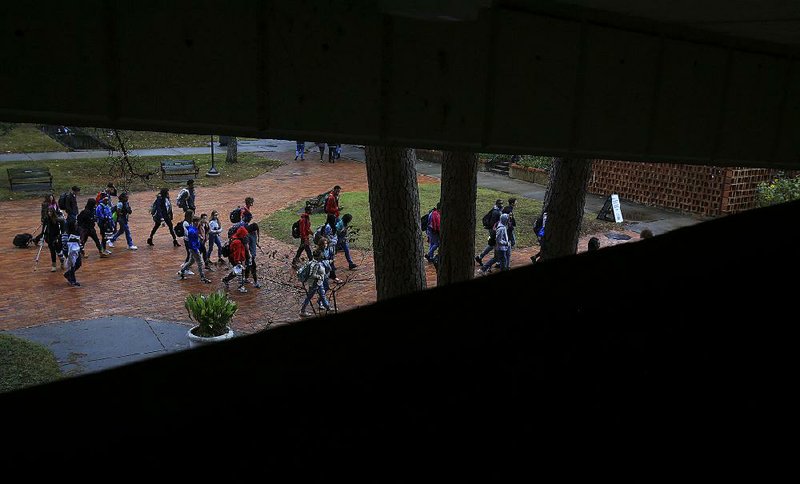A University of Arkansas at Little Rock administrator's message advising the law school faculty to keep an auditorium's doors closed rather than cracked open for extra ventilation has a professor questioning the school's approach to covid-19 classroom safety.
Robert Steinbuch said he teaches about 115 students in UALR's William H. Bowen School of Law for 90- minute classes on Tuesdays and Thursdays.
Last week, "when I got to class, I knew there were doors in the room, so I propped the doors open with a couple of tissue boxes," said Steinbuch.
Doors to what's known as the Friday Courtroom -- unlike most classrooms -- open to the outdoors.
The U.S. Centers for Disease Control and Prevention on its website lists ventilation recommendations for schools and child care centers.
[CORONAVIRUS: Click here for our complete coverage » arkansasonline.com/coronavirus]
"If safe to do so, open windows and doors," states a CDC recommendation under the heading, "Bring in as much outdoor air as possible."
Knowing about the CDC recommendation, "it wouldn't have dawned on me that there would be any controversy at all," said Steinbuch, who in the past has been at odds with his employer, including in a court battle over admissions records that he sought of students admitted to the law school.
As far as propping the doors, "why not create an outcome that is win-win for everyone, with some marginal increase in the cost of air conditioning?" Steinbuch said.
But Steinbuch said he hasn't propped open the doors this week after the law school's dean, Theresa Beiner, requested on Aug. 26 that the doors not be cracked open, citing the hot weather and the effect on the room's air-conditioning and humidity controls.
Cody Decker, UALR's vice chancellor for student affairs and chief data officer, said in a message forwarded by Beiner to the law faculty Tuesday that after consulting with others, the consensus from the university's Coronavirus Emergency Response Team was that "the security risk outweighs the potential benefit from opening the doors."
Steinbuch provided Decker's email to the Arkansas Democrat-Gazette.
Decker's email stated that "there is a concern over the security of the Friday Courtroom when the doors are left open, given the vicinity to a large transient population that occasionally enters the law school property (according to the Department of Public Safety.)"
Decker also stated that a test by an outside firm of the room's heating, venting and air-conditioning system found "that the system is providing the recommended amount of ventilation."
Steinbuch said he did not believe that very many unhoused individuals were near the law school and that he doesn't understand why the university would reject the "very simple solution of propping the door ajar."
Jeff Harmon, a UALR spokesman, in a statement said there's "no campus policy on propping open doors or windows," with the law school classroom treated as an individual case.
"A recent examination of the HVAC system currently in place resulted in findings that showed it is operating sufficiently and safely related to air quality and performance. In addition to Covid-19-related health and safety protocols, the campus is also mindful of other issues that could arise, such as building damage and other efficiencies, as well as general safety matters to protect its faculty, staff and students," Harmon said.
The "main concerns" about keeping the Friday Courtroom doors ajar are building care; maintenance of the heating, ventilation and air conditioning system; and "safety, in general." Harmon said a facilities team "concluded that opening doors does not improve airflow and also has confirmed that the airflow system in place is adequate, efficient and safe."
Harmon said he could not immediately on Wednesday cite recent occurrences of unhoused individuals entering the law school building, but he added that "generally campus police reports occasions of escorting people off campus who do not have a reason to be in the vicinity."
Other law school faculty members contacted by the Democrat-Gazette declined to comment or did not respond to requests for comment.
At the state's two largest universities, open doors and windows are not encouraged for classrooms.
"Windows in most academic buildings are not operable, and where they are we discourage building occupants from opening them," University of Arkansas, Fayetteville spokesman Mark Rushing said in an email. "We also strongly discourage propping doors open both for environmental and safety reasons."
UA-Fayetteville's campus guidance, as published on the university's website, states that ventilation systems in buildings are "maximizing outside air and high-performance filtration."
Bill Smith, a spokesman for Arkansas State University, said in an email that the CDC guidance for schools, as far as opening doors and windows, "does not apply well to higher education."
"On our campus, the vast majority of our windows cannot open. Regarding leaving doors or windows cracked open, in our climate zone, we are risking the development of condensation and in turn the growth of mold or mildew," Smith said. "We also have seasonal air quality concerns that begin about this time of year related to agricultural production."
Smith said the ASU facilities staff at the Jonesboro campus over the past year-and-a-half has "worked with our campus to maximize the amount of air flow possible within our buildings."
Fredricka Sharkey, a spokeswoman for the University of Central Arkansas, said in an email that faculty members teaching classes "open doors or windows at their own discretion, but the university has not issued any directives."

